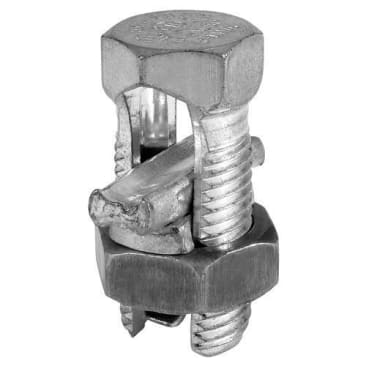Thank you for visiting Bartle & Gibson. If you encounter any issues or have feedback to share, please email us at [email protected]. Your input is greatly appreciated!
content loaded

ILSCO SK-250 COPPER SPLIT BOLT #4-#250 (SW10)
MFR Part #: SK-250
SKU #: 0731916
Brand: ILSCO®
UPC: 78366981912
ILSCO® ClearChoice® SK-250 Type SK Split Bolt Connector, 4 AWG to 250 kcmil ACSR/Compact/Compressed/Concentric/Solid Copper Conductor, 1 x 2.328 in, Copper Alloy
Used in circuits rated 35 kV or less, proper high voltage spacing and insulation techniques, tap connector and splice connector
CSA Certified | UL File No. E12822 | PROP65: Cancer and Reproductive Harm - www.P65warnings.ca.gov
Product Details
Attributes
Features
Resources
ILSCO® ClearChoice® Split Bolt Connector, Type SK, ACSR/Compact/Compressed/Concentric/Solid Copper Conductor, 4 AWG to 250 kcmil Conductor, 1 x 2.328 in Bolt, 2000 VAC, 0.144 in Split, 1.312 in Hex Nut, 650 in-lb Recommended Torque, 90 deg C, Copper Alloy, Electro-Plated Tin, 2.328 in H x 1.312 in W
Bolt Size:
1 x 2.328 in
Conductor Size:
4 AWG to 250 kcmil
Conductor Type:
ACSR/Compact/Compressed/Concentric/Solid Copper
Country Of Origin:
US
Dimensions:
2.328 in H x 1.312 in W
Finish:
Electro-Plated Tin
Material:
Copper Alloy
Specifications:
0.144 in Split, 1.312 in Hex Nut, 650 in-lb Recommended Torque
Temperature Rating:
90 deg C
Type:
Type SK
Voltage Rating:
2000 VAC
- Manufactured from high strength copper alloy provides maximum conductivity and high breakage resistance
- Electro-tin plated bolt, nut, spacer and pressure bar provides low contact resistance
- For use with solid, compact, compressed, concentric copper conductors
- Precision tooled threads allows maximum torque to be applied
- For other aluminum applications consult factory
- Provides maximum conductivity and high breakage resistance
- Application versatility
- Proper high voltage spacing and insulation techniques must be used
Product Details
ILSCO® ClearChoice® Split Bolt Connector, Type SK, ACSR/Compact/Compressed/Concentric/Solid Copper Conductor, 4 AWG to 250 kcmil Conductor, 1 x 2.328 in Bolt, 2000 VAC, 0.144 in Split, 1.312 in Hex Nut, 650 in-lb Recommended Torque, 90 deg C, Copper Alloy, Electro-Plated Tin, 2.328 in H x 1.312 in W
Attributes
Bolt Size: 1 x 2.328 in
Conductor Size: 4 AWG to 250 kcmil
Conductor Type: ACSR/Compact/Compressed/Concentric/Solid Copper
Country Of Origin: US
Dimensions: 2.328 in H x 1.312 in W
Finish: Electro-Plated Tin
Material: Copper Alloy
Specifications: 0.144 in Split, 1.312 in Hex Nut, 650 in-lb Recommended Torque
Temperature Rating: 90 deg C
Type: Type SK
Voltage Rating: 2000 VAC
Features
- Manufactured from high strength copper alloy provides maximum conductivity and high breakage resistance
- Electro-tin plated bolt, nut, spacer and pressure bar provides low contact resistance
- For use with solid, compact, compressed, concentric copper conductors
- Precision tooled threads allows maximum torque to be applied
- For other aluminum applications consult factory
- Provides maximum conductivity and high breakage resistance
- Application versatility
- Proper high voltage spacing and insulation techniques must be used
